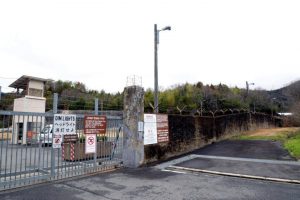PFAS detected near U.S. Kawakami Ammunition Depot in Higashihiroshima: Existing instruction key to locating contamination source
Apr. 2, 2024
Expert: “Action can be demanded”
Outside scope of Japan-U.S. Status of Forces Agreement, local community demands can serve as driving force
by Takamasa Kyoren, Staff Writer
Multiple cases of high concentrations of per- and polyfluoroalkyl substances (PFAS), suspected cancer-causing chemicals, have been detected in water drawn from wells near the U.S. Army Kawakami Ammunition Depot in Higashihiroshima City. However, efforts to identify the source of contamination are being impeded by the Japan-U.S. Status of Forces Agreement (SOFA), which grants the U.S. military exclusive rights over administration of its facilities in Japan. The Higashihiroshima City government has requested that the U.S. military conduct an environmental survey inside the depot property, but no progress on the issue has been made to date. According to one expert, the local community needs to continuously make cogent appeals for solutions to the problem. “There is room for Japan to urge the United States to take action within the framework of the existing agreement,” said the expert.
The Muneyoshi district in the town of Hachihonmatsu-cho, Higashihiroshima City is situated on the headwaters of the Senogawa River. The land of the Kawakami Ammunition Depot extends beyond the gates marking the edge of the town. High concentrations of PFAS, exceeding the tentative limit established by the Japanese government (50 nanograms per liter), have been detected in water from many of the wells in the area.
A local man, in his 70s, voiced his concerns. “The inconvenience in our daily life and anxiety about our health continue to rise because even the cause of the contamination is unclear.” Earlier this year in February, the well water for use in his home was found to exceed the limit. He has managed to make do using the water supplied by the city in plastic bottles.
According to a survey of the Senogawa River watershed that the city initiated last year, PFAS values exceeded the limit in 25 of a total of 99 locations such as water channels and wells. In well water near the ammunition depot, PFAS values were measured at 300 times the limit established by the government. PFAS have not been found in water upstream of the depot and, for that and other reasons, the city considers the ammunition depot to be the likely source of the high levels.
However, efforts to identify the source of contamination have yet to make progress because the SOFA agreement remains an obstacle. Higashihiroshima City Mayor Hironori Takagaki said, “We cannot directly access the area in question due in part to the SOFA agreement.” In reality, the city can only continue to demand that the national government and other parties call on the U.S. military to conduct water-quality and soil surveys on ammunition depot land.
Agreement to supplement SOFA on environmental stewardship
Under SOFA, Japanese authorities are not allowed to enter U.S. bases in Japan for the purpose of conducting environmental surveys without permission from the U.S. military. In recent years, high concentrations of PFAS have been detected in the area around other U.S. military bases in Japan, such as those in Okinawa and Tokyo, but environmental surveys for those areas have also not been carried out yet.
Examples of surveys being conducted do exist. For both of the U.S. Atsugi and Yokosuka military bases in Kanagawa Prefecture, for example, local governments and other stakeholders carried out investigations within the base properties, based on a supplemental agreement on environmental stewardship that allows Japanese authorities to access the facilities “only in cases such as a contemporaneous environmental incident, including contamination within the facility.” The surveys were possible because the U.S. side conceded that PFAS had in fact leaked. However, the United States is not obligated to notify Japan of the occurrence of such accidents, and surveys are limited to permitted locations. Which is to say that the U.S. side is in control of the effectiveness of the supplementary agreement.
Revision of agreement is unrealistic
In the case of the Kawakami Ammunition Depot, the United States is not expected to take action on the basis of the supplementary agreement absent the U.S. military’s acknowledgement of PFAS leaks. Shinji Kawana, a professor at the Tokyo Institute of Technology and a specialist in international politics, said, “Calling for a revision of the agreement is not realistic. I believe the best approach is to urge the United States to take concrete action in line with instruction 4715.08 issued by the U.S. Department of Defense (DOD) in 2013.”
The instruction stipulates that the United States will remove substances resulting in environmental contamination on DOD installations outside of the United States. This provision applies even to cases of uncertainty with respect to whether the contamination was caused by U.S. military activity. The instruction also states that the United States will cooperate with the host nation for environmental remediation. Mr. Kawana said, “The Japanese government should call on the U.S. military to address the issue based on this instruction. Reasonable calls from local communities would serve as a significant driving force for such action.”
Keywords
Per- and polyfluoroalkyl substances (PFAS)
Substances with properties that serve to repel water and oil. They have been used widely for many purposes, including as coating for frying pans and fire-extinguishing foam for use in aircraft. Extremely resistant to decomposition, the substances remain for a long time in the environment and even accumulate in the bodies of wild animals and humans. More than 10,000 varieties of PFAS now exist, and some are thought to increase cholesterol levels and risk of cancers as well as have deleterious impacts on the immune system, among other effects.
(Originally published on April 2, 2024)









